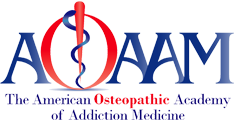American Osteopathic Academy of Addiction Medicine
Update: House of Delegates 2018
The American Osteopathic Association held their annual business and House of Delegates meetings in Chicago July 16-22, 2018, which brought together more than 500 DOs and medical students to consider proposed resolutions and enact AOA policy. Dr. Margaret Kotz was our delegate and Dr. Stephen Wyatt our alternate. Our hearty congratulations to them both for their dedication and work; both in preparation and during these meetings.
The AOAAM submitted Resolution H-215 for consideration, which proposed that it be:
RESOLVED, that Osteopathic physicians who have completed AOA approved fellowships in Addiction Medicine be allowed to take the primary CAQ examination in Addiction Medicine; and, be it
RESOLVED, that clinical practice pathway previously approved by the AOA in Addiction Medicine be reopened for six (6) years for all DOs who wish to become certified in the subspecialty of Addiction Medicine.
Click here for a copy of Resolution H-215.
The resolution went through an internal review process, and the HOD speaker and vice speaker noted that:
- The resolution topic is the responsibility of the AOA Board of Trustees (BOT) and, therefore, should be considered by the AOA Bureau of Osteopathic Specialists (BOS); and
- The resolved outcomes is not directed for policy that would necessarily effect the entire AOA.
It was requested that permission be granted to forward the AOAAM resolution to the BOS for consideration and review. The BOS would then be the entity that would forward it to the AOA BOT for consideration.
Because the BOS had been previously denied opening an Addiction Medicine CAQ, the AOAAM requested that the resolution not be removed for consideration by the HOD. Dr. Kotz then sent a letter to Dr. Boyd Buser, AOA past president, requesting that the AOA BOT review and support Resolution H-215. Dr. Buser was very supportive and indicated that the AOA BOT’s Certifying Board Services Task Force was aware of our issues and looking into a process for consideration of our resolution.
Subsequently, letters were sent to the members of the AOA BOTs assigned to review the resolution, as well as the Education Review Committee members, and all state and specialty executive directors, educating them on the history of the addiction medicine CAQ, identifying the urgent need for certified DOs to better treat our patients and the need for parity with our allopathic colleagues. Dr. Kotz, Dr. Wyatt and Ms. Vidmer argued before several committees during the HOD, as did others who supported our resolution.
On Saturday, the Educational Reference Committee amended H-215 to read the following:
That the American Osteopathic Association (AOA) directs the American Osteopathic Conjoint Examinations Committee on Addiction Medicine, under the direction of the bureau of osteopathic specialists (BOS), to create a psychometrically valid exam for certificate of added qualifications (CAQ)/ subspecialty certification in addiction medicine; and, be it further resolved, that the AOA, through the BOS, develop a certification pathway for addiction medicine; and, be it further resolved, that the AOA, through the BOS, explore the feasibility of reopening the clinical practice pathway in addiction medicine, for a limited time, and report to the house of delegates in 2019..jpg)
We were very encouraged, however when the H-215 came before the House for a vote, it was referred to the Finance Committee because the costs are estimated to exceed $100,000 and, per the AOA bylaws, must therefore be referred.
While the AOAAM is disappointed that Resolution H-215 did not advance this year, we are heartened that we gained support from many AOA BOTs, and AOA state and specialty organizations. During the next year, we will work to ensure that the Conjoint Committee complies with its directive from the BOS to create a recertification exam, which will assist the Finance Committee in their assessment of the cost of the primary. We ask that you continue to educate your colleagues on the importance of a primary CAQ so that next year, our resolution passes.
Our thanks again to Dr. Kotz and Dr. Wyatt, and the entire the AOAAM Board for their work. We are hopeful that soon, all osteopathic physicians who are qualified may sit for an AOA Addiction Medicine CAQ exam, just as our allopathic colleagues do through the American Board of Medical Specialties under the American Board of Preventive Medicine.
